2019 Featured Speakers
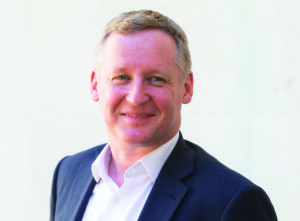
Stuart Reid, CBE BVMS PhD DVM DipECVPH FRSE MRCVS
CRWAD Centennial Featured Speaker
“Science With Impact: Rare or Well Done?”
Stuart Reid is Principal of the Royal Veterinary College (RVC), University of London. The oldest and largest veterinary school in the world, the RVC recently ranked as the top school globally in the prestigious QS World University rankings. The UK’s only independent veterinary school, in 2017 the college came first in the National Student Survey of all UK universities.
An alumnus of the University of Glasgow, he became one of its youngest professors in 1996 and dean in 2005 before moving to the RVC in 2011. Reid is a recognized by the Royal College of Veterinary Surgeons as a specialist in veterinary epidemiology and in veterinary public health by the European Board of Veterinary Specialists, and is a Fellow of the Royal Society of Biology and the Royal Society of Edinburgh. Reid was President of the Royal College of Veterinary Surgeons (RCVS) in 2014-15, a year which saw the launch of a new Royal Charter. He has also been president of the European College of Veterinary Public Health and honorary secretary of the Association of American Veterinary Medical Colleges, in both cases the first UK national to hold these positions. In his public service, he has been a trustee of The Donkey Sanctuary since 1996 and Chairman of Trustees since 2007. The charity is now the largest of equine welfare organization worldwide. He is a Trustee of the University of London and sits on the Board of the Food Standards Agency in the UK. Reid has been recognized for his work by industry (Pfizer, Petplan Charitable Trust), the profession (the British Veterinary Association’s Wooldridge Medal and the Dalrymple-Champneys Cup), his alma mater (the McCall Lecture, University of Glasgow) and his scientific discipline in the UK, EU and USA. He was awarded a CBE in the Queen’s Birthday Honours in 2018 for services to the veterinary profession and higher education.
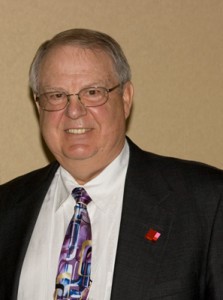
Robert Ellis, PhD, CBSP (ABSA), SM (ASM), DACVM
CRWAD Centennial Featured Speaker
“Interesting Facts on the Early Years of CRWAD”
Robert Ellis, PhD, CBSP, graduated from the University of Wyoming with a BS in Microbiology. Bob’s education continued with the MS and PhD degrees earned at the Purdue University School of Veterinary Medicine. Bob joined the faculty at Colorado State University in January 1978, and is Professor, Department of Microbiology, Immunology and Pathology. Bob was appointed to the CSU Biosafety Committee in 1978, and was Biosafety Officer 1986–1989, and is currently the University Biosafety Director (1997–present). Dr. Ellis was the Executive Director of the Conference of Research Workers in Animal Diseases (CRWAD) from 1987 through 2014, and was the Founding Editor-in-Chief of Animal Health Research Reviews. Bob first attended and presented at the CRWAD in 1967, when he was a graduate student at Purdue University. From 1967-2014, Bob missed only 3 CRWAD annual conferences. Bob is a Certified Biological Safety Professional and a Diplomate, American College of Veterinary Microbiologists (Honorary). He was elected to the American Biological Safety Association (ABSA) Council in October, 2004, and was elected President-Elect of ABSA for 2008. He served as the ABSA President October 2008 to October 2009. Bob received the 2015 Everett Hanel, Jr. Presidential Award which is awarded to a current ABSA member for “outstanding contributions to the American Biological Safety Association by promoting the field of biological safety and fostering, by example, the high professional standards of the Association’s membership.”

Yoshihiro Kawaoka, DVM, PhD
CRWAD Centennial Council Keynote Speaker
“Working with deadly viruses: battling Ebola and influenza”
Dr. Yoshihiro Kawaoka is Director of the Influenza Research Institute and Professor in the Department of Pathobiological Sciences at the UW-Madison School of Veterinary Medicine. He holds a concurrent appointment as Professor at the Institute of Medical Science of the University of Tokyo. Dr. Kawaoka was educated in Japan, receiving his DVM in 1978 and his PhD in 1983 from Hokkaido University. Dr. Kawaoka established the technique of reverse genetics, which allows the generation of ‘designer’ influenza viruses. This technology – coupled with his findings regarding the attenuation of deadly influenza viruses – has been used to develop candidate H5N1 influenza virus vaccines. Reverse genetics is also used to generate live attenuated influenza vaccines. Dr. Kawaoka found that the presence of multi-basic residues in the hemagglutinin cleavage site determines the high pathogenicity of avian influenza viruses, he identified specific mutations in viral polymerase and hemagglutinin that confer avian influenza virus airborne transmissibility in mammals, and he discovered that 1918 Spanish influenza virus infection caused an abnormal immune response. In addition to his work with influenza virus, Dr. Kawaoka also studies Ebola virus. He was the first to establish a pseudotype virus system that allows the analysis of Ebola virus glycoprotein under BSL2 conditions. Dr. Kawaoka has developed another system that allows the study of the entire Ebola virus replication cycle under non-BSL4 conditions. In recognition of his achievements, Dr. Kawaoka was awarded the Robert Koch Award in 2006; he received the Medal of Honor (Purple Ribbon) in 2011 and the Japan Academy Award in 2016 from the Emperor of Japan for his research in the field of influenza virology. In 2013, he was elected as a Foreign Associate of the United States National Academy of Sciences. In 2015, he received the UNESCO Carlos J. Finlay Prize for Microbiology.
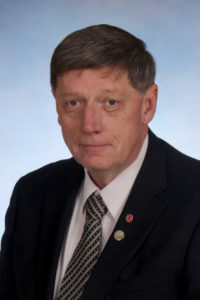
David Benfield, PhD
Microbiology and Disease Pathogenesis Centennial Speaker
“Viral Diseases of Swine: Lessons from Past, Present and Future”
David A. Benfield is currently the Associate Vice President and Director of the Wooster Campus and Associate Director of the Ohio Agricultural Experiment Station in the College of Food, Agricultural and Environmental Sciences at The Ohio State University. He received his BS (1973) and MS degrees (1976) from Purdue University and a PhD in Microbiology (1979) from the University of Missouri-Columbia. He has a distinguished career of research, teaching and outreach related to RNA virus infections (rotavirus, coronavirus, arteriviruses) of the respiratory, intestinal and reproductive systems of agricultural animals. In 1990, he, and former graduate students Dr. Jim Collins (U. Minnesota) and Dr. Eric Nelson (South Dakota State University) co-discovered the virus causing porcine reproductive and respiratory syndrome (PRRS), the leading economic disease of swine in the world. He is a member of the American Society for Virology, American Association of Veterinary Laboratory Diagnosticians, American Association of Swine Veterinarians, and American Association for the Advancement of Science and an Honorary Diplomat of the College of Veterinary Microbiologists.
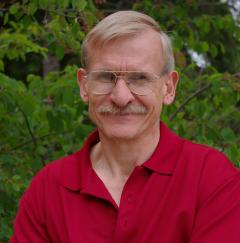
Charles Czuprynski, PhD
Immunology Centennial Speaker
“Veterinary Immunology then and now: 40th Anniversary of the American Association for Veterinary Immunologists.”
Chuck Czuprynski PhD is and Professor and Chair of the Department of Pathobiological Sciences, School of Veterinary Medicine, and Director of the Food Research Institute at the University of Wisconsin-Madison. His research focuses on the pathogenesis of bacterial pathogens, with an emphases on the innate immune response to bovine respiratory pathogens and on zoonotic agents that cause foodborne disease (i.e. Listeria monocytogenes, Salmonella enterica). His lab also has investigated novel strategies to combat wound infections and the adverse effects of environmental toxins on the immune system. He received his BA in Biology from Knox College and his PhD in Medical Microbiology from UW-Madison in 1980. He completed a postdoctoral fellowship at National Jewish Hospital in Denver, Co before joining the faculty at UW-Madison in 1983. He is a Diplomate of the American Academy of Microbiology and Honorary Diplomate of the American College of Veterinary Microbiologists.
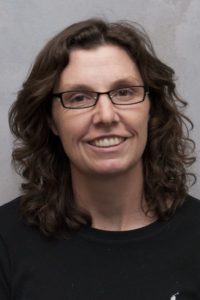
Annette O’Connor, DVSc
Population Health Centennial Speaker
“Causal inference, reproducible research and research synthesis in veterinary science”
Dr. O’Connor is a veterinary epidemiologist who works in the area of research synthesis and primary research related to food production, public health, food safety and uses of animals. This work involves combining research is transparent and comprehensive ways that ensure maximum value is obtained from societies investment in research funding. Dr. O’Connor has worked in a diverse set of fields including food-borne pathogens of animal proteins, food production, biomedical uses of animals, and veterinary public health. The main aim of Dr. O’Connor’s work is to help end users better understand the results of research so decisions makers such as industry bodies, veterinary practitioners and government officials can incorporate primary research into decisions i.e. science supported decision making. Dr. O’Connor is a founding member of the SYREAF group – which focuses on Systematic reviews for Animals and Food (http://www.syreaf.org) and co-chair of the newly formed Campbell Collaboration Food Security group (https://campbellcollaboration.org ). Dr. O’Connor has also been involved in several international efforts to improve reporting in veterinary science. In particular, the Meridian network ( Menagerie of Reporting Guidelines Involving Animals — https://meridian.cvm.iastate.edu/ a clearing house for reporting guidelines for research that involves animals and she has worked with Dr. J Sargeant and other collaborators to develop the REFLECT statement (www.reflect-statement.org). the STROBE-Vet statement (https://meridian.cvm.iastate.edu/strobe/)
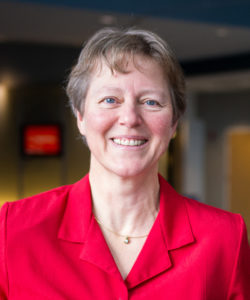
Bettina Wagner, DVM
AAVI Distinguished Immunologist
“Host immunity against equine herpesvirus type 1”
Dr. Wagner is a Professor of Immunology and the Chair of the Department of Population Medicine and Diagnostic Sciences at the College of Veterinary Medicine at Cornell University. She earned her DVM and PhD degrees at the University of Veterinary Medicine in Hannover, Germany. In 2006, she joined the faculty of the Department of Population Medicine and Diagnostic Sciences at Cornell. Dr. Wagner’s research focuses on equine immunology and host-pathogen interaction with the goal to develop novel preventive strategies and treatments for allergic diseases and equine herpesvirus type 1. For her research projects, she maintains a specific-pathogen free herd of fifty Icelandic horses at Cornell to identify key immune mechanisms of disease and protection. Dr. Wagner has worked for many years in equine immune reagent development to generate monoclonal antibodies against key molecules of the immune system of the horse and to provide these tools to the national and international equine research communities. In addition, she serves as the Director of the Serology/Immunology laboratory at the Animal Health Diagnostic Center at Cornell. In this function, she is responsible for the development of new serological assays such as the popular Lyme Multiplex Assay for horses and dogs. The assay is routinely used by many veterinarians throughout the endemic Lyme regions in the US.
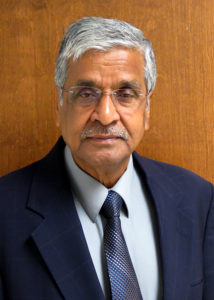
T.G. Nagaraja, PhD
ACVM Distinguished Microbiologist
“Bovine Gut Microbes: Implications beyond the gut”
T. G. Nagaraja is a University Distinguished Professor of Microbiology in the Department of Diagnostic Medicine/Pathobiology in the College of Veterinary Medicine. His appointment is 70% research and 30 % teaching. His research expertise is in gut microbiology of cattle. His research has focused primarily on role of rumen microbes in function and dysfunction of the rumen, and on food borne pathogens, particularly Shiga toxin-producing Escherichia coli and Salmonella in cattle. His teaching responsibilities include Veterinary Bacteriology and Mycology Lecture and Laboratory for the sophomore DVM students, Ruminant Digestive Physiology for the freshman DVM students, two graduate courses, Rumen Metabolism and Rumen Microbiology. Additional responsibilities include serving as the Director of the PhD Program in Pathobiology and the MS Program in Veterinary Biomedical Science in the College of Veterinary Medicine. Dr. Nagaraja’s research is a blend of basic and applied studies and involves collaborative interactions with epidemiologists, molecular biologists, pathologists, and ruminant nutritionists. Nagaraja and his associates have made significant contributions in the following areas: Use of ionophore antibiotics in cattle, Causes, pathogenesis and vaccine development for liver abscesses in feedlot cattle; causes and preventions of ruminal disorders, such as acidosis and bloat; Ecology of Shiga toxin-producing E. coli and Salmonella in cattle; and, Antimicrobial resistance and Antimicrobial alternatives.
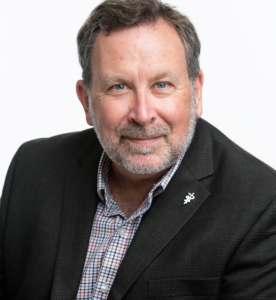
David R. Smith, DVM, PhD
Population Health Featured Speaker
”Systems Thinking in Human, Animal, and Environmental Health”
David R. Smith, D.V.M., Ph.D., is the Mikell and Mary Cheek Hall Davis Endowed Professor and Beef Program Leader at Mississippi State University College of Veterinary Medicine. He is a board-certified veterinary epidemiologist with special interest in discovery and outreach regarding pre-harvest food safety in cattle, antimicrobial stewardship, and methods to manage cattle populations to reduce the incidence of important diseases, including Johne’s disease, BVDV, respiratory disease and neonatal calf diarrhea. Dr. Smith has served on the Secretary of Agriculture’s Committee on Animal Health, American Veterinary Medical Association (AVMA) Steering Committee on Antimicrobial Resistance, the American Association of Bovine Practitioners (AABP) Committee on Food Quality, Safety and Security, Biological Risk Committee, and was a member and chair of the AVMA Food Safety Advisory Committee. He has served as President of the American Association of Extension Veterinarians and the Epidemiology Specialty of the American College of Veterinary Preventive Medicine (ACVPM). Dr. Smith currently serves on the AVMA Committee on Antimicrobials and the AABP Committee on Pharmaceutical and Biologic Issues. He received the ACVPM Hellwig-Jenner Award and the AABP Award of Excellence.
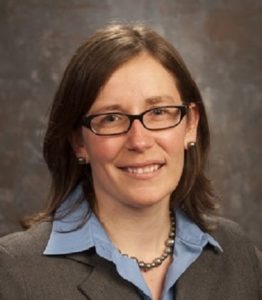
Dannele Peck, PhD
Population Health Featured Speaker
”Two Diseases Meet at the Livestock-Wildlife Interface: Can We Manage for Both?”
Dannele Peck, PhD, graduated from the University of Wyoming with a BS in Wildlife Biology and an MS in Agricultural Economics, followed by a doctoral degree in Agricultural & Resource Economics from Oregon State University. Dannele returned to the University of Wyoming as a faculty member, where she collaborated with veterinary science colleagues on the “epi-nomics” of livestock- wildlife diseases such as brucellosis, bluetongue, vesicular stomatitis, and FMD. As an agricultural economist, she focuses on decision-making under uncertainty, and strives to make economics more useful and accessible to other disciplines. Dannele now works for the USDA Agricultural Research Service in Fort Collins, Colorado, as Director of the USDA Northern Plains Climate Hub. Her team develops and communicates science-based resources to improve farm and ranch resiliency to extreme weather and a changing climate. The economic implications of climate change for animal health are therefore among her newest interests. Raised on a dairy farm in upstate New York, Dannele is a first-generation college student and proud alumna of the McNair Scholars Program.
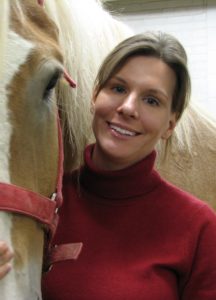
Molly McCue, DVM, MS, PhD, DACVIM
Population Health Featured Speaker
“Working Towards Precision Medicine in the Horse”
Dr. McCue received her DVM from Kansas State University, completed an internship in large animal medicine and surgery at the University of Georgia and a residency in equine internal medicine at Kansas State University. She is a Diplomate of the American College of Veterinary Internal Medicine (Large Animal). Dr. completed her MS degree in Clinical Sciences (epidemiology) at Kansas State University and her PhD in Comparative and Molecular Biosciences (genetics) and postdoctoral studies (genetic epidemiology) at the University of Minnesota. Dr. McCue is currently a professor at the University of Minnesota; she is a faculty member in the Wellstone Muscular Dystrophy Center, University of Minnesota’s Informatics Institute and the Microbial and Plant Genomics Institute. In 2018 Dr. McCue was appointed the Interim Associate Dean for Research in the College of Veterinary Medicine. Dr. McCue’s research is primarily focused on Equine Metabolic Syndrome, Polysaccharide Storage Myopathy, Recurrent Exertional Rhabdomyolysis and performance traits related to metabolic and muscle phenotypes. Dr. McCue’s group has also devoted a significant amount of time developing the tools and resources needed to carry out equine genomic research.
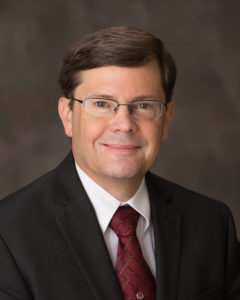
Rodney A. Moxley, DVM, PhD
ACVM- Microbiology & Disease Pathogenesis Featured Speaker
“Culture-Based Detection of Non-O157 Enterohemorrhagic Escherichia coli: Can Further Improvements be Made?”
Dr Moxley is a Charles Bessey (Distinguished) Professor in the School of Veterinary Medicine and Biomedical Sciences at the University of Nebraska-Lincoln. Dr. Moxley received his Doctor of Veterinary Medicine and PhD in Pathology from the University of Missouri-Columbia. His academic career has mainly focused on Shiga toxin-producing Escherichia coli (STEC). Dr. Moxley has published 91 refereed journal articles with over half pertaining to STEC, and involving studies on the pathogenesis in natural disease, animal models, and in vitro models, immune responses, pre- and post-harvest epidemiological studies, pre-harvest intervention studies, and diagnostic test development. He is the Project Director of a USDA, National Institute of Food and Agriculture, Coordinated Agricultural Project that aims to reduce the public health risk to non-O157 STEC throughout the beef chain.

Amy Vincent, DVM, PhD
ACVM- Microbiology & Disease Pathogenesis Featured Speaker
“Ten years after the 2009 H1N1 pandemic – what have we learned about the swine-human interface of influenza?”
Dr. Vincent is a Research Veterinary Medical Officer and Lead Scientist at the USDA-ARS National Animal Disease Center (NADC) in Ames, Iowa, conducting research on influenza A virus and developing intervention strategies against influenza in swine. She obtained a B.S. in Recombinant Genetics from Western Kentucky University in Bowling Green and an M.S. in Genetics, a DVM, and a Ph.D. in Immunobiology from Iowa State University in Ames. Dr. Vincent has over 20 years of experience in swine production and animal health research, including influenza. IAV represents a unique agent that is pathogen to pigs, humans, and numerous other species, and the NADC studies focus on IAV in the natural swine host and at the swine and human interface. Three areas of IAV research at NADC involve characterizing currently circulating and emerging IAV in swine, investigating virulence properties and host range, and developing novel vaccine approaches.
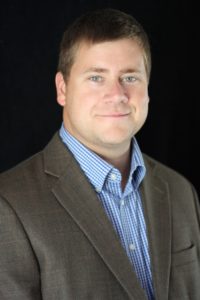
Benjamin Beck
AAVI- Immunology Featured Speaker
“Bacterial infections of catfish: mechanisms of pathogen virulence, host susceptibility, and novel control measures”
Dr. Benjamin Beck is the Director of the USDA-ARS Aquatic Animal Health Research Unit in Auburn, Alabama. Dr. Beck joined ARS as a Research Physiologist/Lead Scientidst in 2010 at the Harry K. Dupree Stuttgart National Aquaculture Research Center in Stuttgart, Arkansas. Dr. Beck earned his B.S. and M.S. degrees in Fisheries and Allied Aquacultures (Fish Pathology emphasis) from Auburn University, and a Ph.D. in Molecular and Cellular Pathology along with a postdoctoral fellowship in Cancer Immunology from the University of Alabama at Birmingham. Dr. Beck has collaborated with researchers, producers, and industry partners nationally and internationally on numerous projects related to improving the production and health of farmed catfish, tilapia, hybrid striped bass, and shellfish. His recent research involves the development of a vaccine for Aeromonas hydrophila, gaining new insight into host:pathogen dynamics, and understanding the influence of nutrition on mucosal immunity. He has authored or co-authored over 75 refereed journal articles, several book chapters, is an Editor of a comprehensive textbook on mucosal health, and his work has been featured numerous times in trade journals and periodicals. Within the past five years, he has been presented with a USDA-ARS Early Career Scientist award, a distinguished early career award from the US Aquaculture Society, and a distinguished alumni award from the Auburn University College of Agriculture.
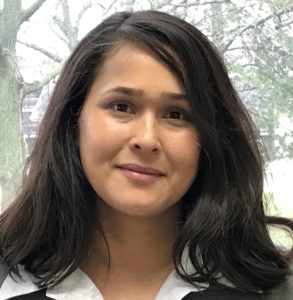
Leela Noronha, DVM, PhD
AAVI- Immunology Featured Speaker
“Preliminary evaluation of a recombinant subunit vaccine for the protection of white-tailed deer (Odocoileus virginianus) from epizootic hemorrhagic disease”
Leela Noronha is a Research Veterinary Medical Officer in the USDA-ARS Arthropod-Borne Animal Diseases Research Unit in Manhattan, KS. She earned her DVM from the Virginia-Maryland Regional College of Veterinary Medicine in 2001. Following four years in private veterinary practice, she went on to study mechanisms of immunological tolerance in equids as an NIH Ruth L. Kirschstein National Research Service Award (NRSA) Fellow at Cornell University where she completed her PhD in Immunology in 2012. Prior to joining ARS in 2016, she assessed infectious disease risks for the Department of Defense. She currently studies mammalian responses to arboviral diseases, including Japanese encephalitis, Rift Valley fever, and epizootic hemorrhagic disease.

Kevin Henry, BSc, MSc, PhD
AAVI- Immunology Featured Speaker
“Genetics and immunological functions of camelid heavy chain antibodies”
Kevin Henry is a research officer at the National Research Council Canada and an adjunct professor in the Department of Biochemistry, Microbiology and Immunology at the University of Ottawa. Prior to joining NRC in 2014, Dr. Henry completed his BSc and PhD degrees in molecular biology and immunology at Simon Fraser University as well as a MSc degree in epidemiology at the London School of Hygiene and Tropical Medicine. Much of his work addresses the molecular immunology of antibody responses. His current research focus includes: (i) the biology and genetics of camelid heavy chain-only antibody responses, (ii) protein engineering strategies integrating in vitro display technologies with high-throughput DNA sequencing, and (ii) development of multimodal antibody therapeutics using single-domain antibodies.
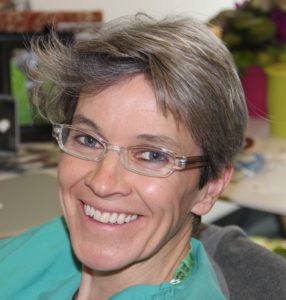
Nicola Mason, B. Vet. Med, PhD, DACVIM
AAVI- Immunology Featured Speaker
“Testing next-generation genetically engineered T cells in dogs with cancer and autoimmunity”
Nicola Mason is an Associate Professor in the Department of Clinical Sciences and Advanced Medicine at the University of Pennsylvania’s School of Veterinary Medicine. She received her veterinary degree from the Royal Veterinary College, London and her Immunology PhD from the University of Pennsylvania. Dr. Mason’s translational research group focuses on evaluating the safety and therapeutic effect of immunotherapies in pet dogs with spontaneous cancer. Her work pioneering the translation of a live, recombinant HER2 targeting Listeria in dogs with osteosarcoma earned her the One Health Award for Excellence in promoting One Health Initiatives and Interprofessional Education. Her research interests also include adoptive immunotherapy using CAR T cells in canine patients with B cell malignancies, glioblastoma metastatic OSA and autoimmunity. Through comparative oncology her work aims to accelerate the clinical translation of effective immunotherapies, improving the lives of both humans and dogs.
100th Meeting of the Conference of Research Workers in Animal Diseases
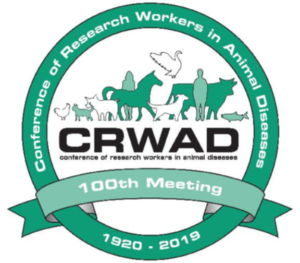
In 2019, the Conference of Research Workers in Animal Diseases will meet for the 100th time. The longevity of CRWAD is a testament to the dedication and passion of researchers who work to identify causes of animal disease, and to discover effective approaches to treatment and prevention. In recognition of this centennial milestone, the 2019 CRWAD meeting will include special events on the theme “Looking Back and Looking Forward”. On Sunday afternoon, three featured speakers, Dr. David Benfield, Dr. Charles Czuprynski, and Dr. Annette O’Connor, representing microbiology, immunology, and population health, respectively, will speak on important events from the past and exciting prospects for the future of their disciplines. The afternoon will culminate with the address by this year’s CRWAD keynote speaker, Dr. Yoshihiro Kawaoka, a renowned influenza researcher.
The Sunday afternoon presentations will be followed by a cocktail hour. Sunday evening will culminate in a celebratory banquet open to all CRWAD attendees. Dr. Robert Ellis, Past Executive Director of CRWAD, will say a few words about interesting facts related to the early years of CRWAD. The banquet will then conclude with an address by Dr. Stuart Reid, Principal of the Royal Veterinary College (RVC), University of London. Dr. Reid, an internationally recognized specialist in the fields of veterinary epidemiology and public health, and past president of the Royal College of Veterinary Surgeons, will give attendees some food for thought as they set out on the next 100 years of animal health research.
Centennial Speakers

2019 Satellite Meetings
US Animal Vaccinology Research Coordination Network
Come and be a part of the Network to empower and connect those conducting research in agricultural and aquacultural vaccinology! Through a new USDA NIFA initiative, the US Animal Vaccinology Research Coordination Network has been created. The inaugural meeting will be held Saturday, November 2, 2019, from 1-4pm in the Miami/ Scottsdale room. We seek enthusiastic stakeholders from across academia, government, corporate, and production communities, to help drive forward research aimed at ending animal disease through next-generation safe and effective vaccines.
To kick off the Network’s scientific program, we are pleased to have the following keynote speakers addressing key issues for veterinary vaccinology today and in the future:
- Roy Curtis (University of Florida) presenting “Animal Vaccines – Current Availability, Future Needs and Technologies to Deliver”
- Dan Rock (University of Illinois Champaign Urbana) presenting “Challenges for African swine fever vaccine development”
The Network is now establishing its early priorities and eyeing those of the future. So come and take part in our open panel discussions regarding our most critical needs, share your thoughts on our widest gaps in knowledge, and contribute ideas as to how together as a community we can target solutions. Let’s all network toward improved vaccines.
Program
1:00 Welcome and description of the Network and the Leadership
1:20 Comments from USDA Leadership
1:30 Keynote presentation: Roy Curtis: “Animal Vaccines – Current Availability, Future Needs and Technologies to Deliver”
2:15 Gwynneth Clay (Galvmed): Brucellosis Vaccine Prize
2:20 Break
2:30 Keynote presentation: Dan Rock: “Challenges for African swine fever vaccine development”
3:15 Round Table Discussion
4:00 Adjourn
Brucellosis
The 2019 International Brucellosis Society (Annual Brucellosis Research Conference) will be held Saturday, November 2 – Sunday, November 3, from 8am to 5pm, as a CRWAD satellite organization. Scheduled guest keynote speakers include Drs. Sergio Costa Oliveira and Elizabeth A. Rucks. For further information or an invitation, please contact Sue D. Hagius ([email protected]). Attendance requires a separate registration; abstract submission details are available from Sue.
NC-1202
NC-1202 Regional Research Technical Committee Meeting “Enteric Diseases of Food Animals: Enhanced Prevention, Control and Food Safety” will be held November 2 from 7:30 am to 5pm, as a CRWAD satellite organization. For further information or an invitation, please contact Devendra H. Shah ([email protected]). Attendance requires a separate registration; membership and abstract submission details are available from Devendra.
2019 Schedule at a Glance
Saturday, November 2nd
NA PRRS Symposium
- 8:00 – 12:00 pm – Translational Science and Innovations Presentations
- 12:00 – 1:00 pm – Lunch
- 1:00 – 5:00 pm – NA PRRSS / NC-229 Invited Talks and Presentations on Emerging and Foreign Diseases
- 5:00 – 5:30 pm – Break
- 5:30 – 7:30 pm – NA PRRSS/NC-229 Poster Session / Reception / Research Discussions
The US Animal Vaccinology Research Coordination Network
- 1:00 – 4:00 pm – Inaugural Meeting
Sunday, November 3rd
- 8:00-9:30 am
- CRWAD Oral Presentations (six simultaneous sessions)
- Population Health Featured Speakers:
- David Smith, DVM, PhD, DACVPM – “Systems Thinking in Human, Animal, and Environmental Health”
- Danelle Peck, DVM, PhD – “Two diseases meet at the livestock-wildlife interface: Can we manage for both?”
- 9:30-10:00 am – Break
- 10:00-11:30 am
- CRWAD Oral Presentations (seven simultaneous sessions)
- Population Health Featured Speakers:
- Molly McCue, DVM, MS, PhD, DACVIM – “Working Towards Precision Medicine in the Horse”
- Gizem Levent – Mark Gearhart Award – “Population dynamics of Salmonella enterica after metaphylactic antibiotic use in cattle followed to slaughter.”
- 11:30-2:00 pm — Poster Session I and Refreshments
Centennial Celebration
- 2:00-3:30 pm – CRWAD Centennial Speakers (combined sessions)
- Annette O’Connor, DVSc – “Causal inference, reproducible research and research synthesis in veterinary science”
- David Benfield, PhD – “Viral Diseases of Swine: Lessons from Past, Present and Future”
- 3:30-4:00 pm – Break
- 4:00-5:30 pm– CRWAD Centennial Speakers (combined sessions)
- Charles Czuprynski, PhD – “Veterinary Immunology then and now: 40th Anniversary of the American Association for Veterinary Immunologists”
- Yoshihiro Kawaoka, DVM, PhD – “Working with deadly viruses: battling Ebola and influenza”
- 5:30-6:00 pm – Break
- 6:00-7:00 pm – Cocktail Social Hour and Introduction of CRWAD Fellows
- 7:00-9:00 pm – Centennial Celebration Banquet and Featured Speakers
- Presentation of Proclamation from City of Chicago: CRWAD Day, November 3
- Robert Ellis, PhD, CBSP (ABSA), SM (ASM), DACVM – “Interesting Facts on the Early Years of CRWAD”
- Stuart Reid, CBE BVMS PhD DVM DipECVPH FRSE MRCVS – “Science With Impact: Rare or Well Done?”
Monday, November 4th
- 8:30-10:00 am – CRWAD Oral Presentations (seven simultaneous sessions)
- ACVM – Microbiology & Disease Pathogenesis Featured Speakers:
- T.G. Nagaraja, PhD – “Bovine Gut Microbes: Implications beyond the gut”
- Rodney A. Moxley, DVM, PhD – “Culture-Based Detection of Non-O157 Enterohemorrhagic Escherichia coli: Can Further Improvements be Made?”
- ACVM – Microbiology & Disease Pathogenesis Featured Speakers:
- 10:00-10:30 am – Break
- 10:30-12:00 pm — CRWAD Oral Presentations (seven simultaneous sessions)
- ACVM – Microbiology & Disease Pathogenesis Featured Speakers:
- Amy Vincent, DVM, PhD – “Ten years after the 2009 H1N1 pandemic – what have we learned about the swine-human interface of influenza?”
- ACVM – Microbiology & Disease Pathogenesis Featured Speakers:
- 12:00-2:00 pm – Lunch
- 2:00-3:30 pm– CRWAD Oral Presentations (seven simultaneous sessions)
- AAVI – Immunology Featured Speakers:
- Bettina Wagner, DVM – “Host immunity against equine herpesvirus type 1”
- Nicola Mason, B. Vet. Med, PhD, DACVIM – “Testing next-generation genetically engineered T cells in dogs with cancer and autoimmunity”
- AAVI – Immunology Featured Speakers:
- 3:30-4:00 pm—Break
- 4:00-5:30 pm — CRWAD Oral Presentations (seven simultaneous sessions)
- AAVI – Immunology Featured Speakers
- Benjamin Beck, PhD – “Bacterial infections of catfish: mechanisms of pathogen virulence, host susceptibility, and novel control measures”
- Leela Noronha, DVM, PhD – “Preliminary evaluation of a recombinant subunit vaccine for the protection of white-tailed deer (Odocoileus virginianus) from epizootic hemorrhagic disease”
- Kevin Henry, BSc, MSc, PhD – “Genetics and immunological functions of camelid heavy chain antibodies”
- AAVI – Immunology Featured Speakers
- 5:30-5:45 pm – Break
- 5:45-8:00 pm – Poster Session II and Social Time
Tuesday, November 5th
- 8:30-10:00 – CRWAD Oral Presentations (seven simultaneous sessions)
- 10:00-10:30 – Break
- 10:30-12:00 — CRWAD Oral Presentations (seven simultaneous sessions)
- 12:00-12:15 – Break
- 12:15-1:30 – Award Presentations and Closing Comments (seven simultaneous sessions)
